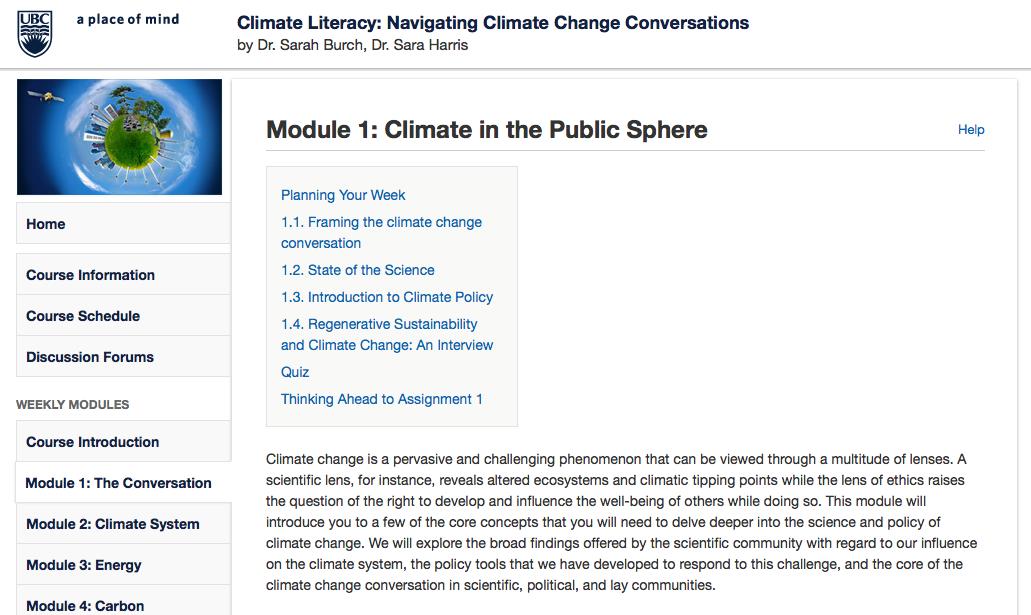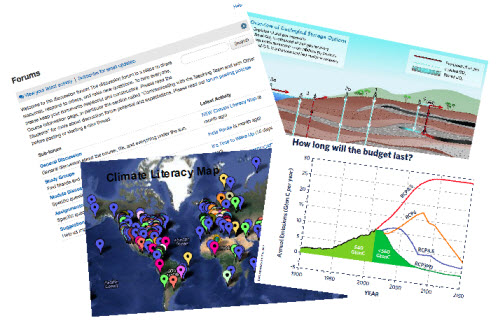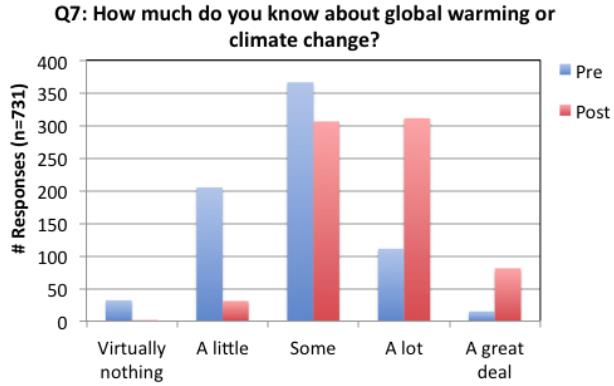Invitation to join second offering of free Climate Literacy course
Posted on 24 September 2013 by Sarah Burch, Sara Harris
This is a guest post by the two lecturers presenting Coursera's Climate Literacy course. Dr. Sara Harris teaches global climate change, environmental science, and oceanography in the department of Earth, Ocean, and Atmospheric Sciences at the University of British Columbia. She has a PhD in Oceanography from Oregon State University and a research background in paleoceanography and paleoclimate. Dr. Sarah Burch is Assistant Professor of Climate and Society at the University of Waterloo, but co-created the course during her time as a Banting Postdoctoral Research Fellow at UBC. She has a PhD in Resource Management and Environmental Studies from UBC and focuses on climate change and sustainability governance.
If you’re visiting Skeptical Science, chances are you’re interested in learning more about climate science and solutions. If you’d like to collaborate in learning with others from around the world, and practice communicating about climate within your own community, we invite you to join us, starting September 30th, 2013, for the second offering of Climate Literacy: Navigating Climate Change Conversations, from the University of British Columbia.
Climate Literacy is a completely free, massive open online course (MOOC) that weaves together both the scientific and the socio-political dimensions of climate change. Rather than narrowly focusing on one slice of the problem, we offer participants the chance to build a strong scientific foundation while considering the human implications, response options, and ethical dimensions of climate change. The course runs over 10 weeks, one Module per week, with an additional week for submission of final assignments and an online exam, but you can complete as much or as little of the course as suits your own goals.

Graphic 1: A peek at Module 1
The real strength of this course (and many other MOOCs) is in the interactivity of the participants. In addition to accessing learning material in various formats (videos, readings, self-tests, marked tests, interactive simulations), participants (1) generate content themselves, about climate change in their own communities, (2) have the opportunity to share their local/regional stories, and to see others’ contributions from around the world and (3) actively practice communicating about climate on the discussion forums. In our last iteration, enrolled students came from 139 different countries, and thousands participated in online discussions while working through the course material. This allows diverse, nuanced conversations about the roots of climate change, responsibility for acting, and pathways to a sustainable future.

Graphic 2: Examples of participant-generated content (discussion forums and climate literacy map) and video content. If you’re a regular reader of SkS (a great resource), you’ll see some SkS materials in the course
By the end of the first offering, participants had solidified connections with others, made plans to continue their interactions beyond the end of the course, and self-reported greater knowledge about climate topics. For a review of the course by a participant from the first offering, see Where SkS-Material gets used: Coursera's Climate Literacy course.

Graphic 3: Comparison of participant response distributions at the start (Pre) and end (Post) of the course
As with any MOOC, Climate Literacy is an experiment. We are challenging ourselves to find new ways to engage meaningfully with a broader audience about issues that matter. This can give rise to heated discussions, requiring all participants to cultivate diplomacy and constructive collaboration. We're also challenged by the pace of change in this field, and by the incredibly diverse range of skills and disciplines that are required to understand it. Given the depth of expertise brought to the course by its participants, we hope to build out tools that facilitate collaboration beyond the course, so that engagement on climate change doesn't end with our last course activity.
We're excited to be offering Climate Literacy a second time and continue the experiment. If you’re interested but can’t join us this time around, watch for a third offering - you can sign up for future notifications at https://www.coursera.org/course/climateliteracy.
Sarah Burch and Sara Harris
p.s. Climate Literacy is one of a growing number of freely-available MOOCs focused on climate and energy issues, each with something unique to offer. Search “climate MOOC” and “energy MOOC” to look for something that fits you.































 Arguments
Arguments






























A "climate literacy" program is a great idea. I am currently reading "Reality Check: How Science Deniers Threaten Our Future (2013) by Donald R. Prothero" where a chart on page 109 includes a list of the top 34 countries by GDP but ordered by the average level of scientific comprehension by their citizens. The countries from 28 to 34 are: Greece, Bulgaria, Lithuania, Latvia, Cypress, The United States of America, Turkey. Yep, Americans sit between Cypress and Turkey which partially explains why there is so much climate denial coming from the USA.
I am signed up for "Global Warming: The Science of Climate Change". Any comment on the differences between the 2 courses? The whole MOOC movement is certainly beginning to make some great resources available.
This is a great course. I went through the first iteration and found it very informative.
I'm currently going through the Coursera Climate Change course through Univ. Melbourne. I am signed up to the Climate Literacy course too. I am looking forward to comparing the two courses, both their content and their approach to dealing with the discussion forums.
The chaotic situation that is present forums on the current course is improving my combat skills. I'm not sure if thats a good learning environment for those who are less assertive.